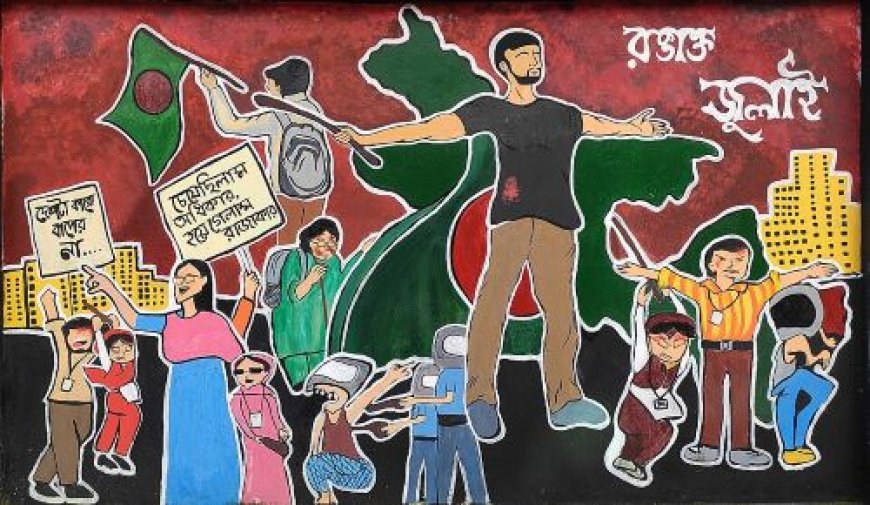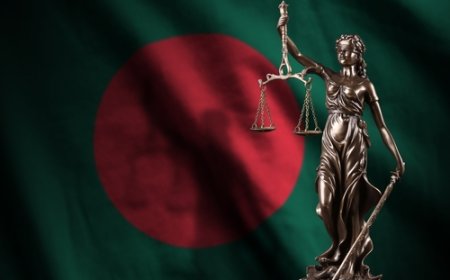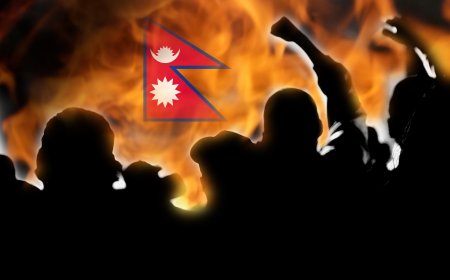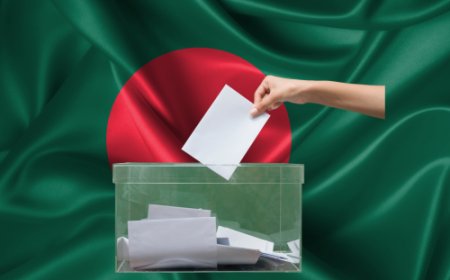Holding the Line for Democracy in Bangladesh: One Year Since the July Revolution
One year after the July Revolution, the memory of brave young lives lost continues to light the path toward a just, democratic, and united Bangladesh

One year ago, in the blazing heat of July, a people’s uprising overthrew an entrenched autocracy in Bangladesh. What began as student protests quickly grew into a nationwide movement -- a diverse, multigenerational, and truly popular uprising. Unarmed civilians, led mainly by students who refused to accept a brutal and corrupt government, filled the streets of Dhaka and beyond.
The regime responded with lethal violence, resulting in over 1,400 deaths and thousands more injured. Yet, the students and their supporters stood firm, managing to bring down a powerful and corrupt regime, that had seemed immoveable.
For many Bangladeshis, at home and in the diaspora, it’s tough to put into words what that month felt like. Each week brought new news and images of injury, arrests, and acts of defiance. And still, the movement kept growing, fueled by years of frustration that went unheard, economic struggles, political repression, and an unshakable hope for dignity and progress.
That uprising is now called the “July Revolution,” and with it, Bangladesh entered a new chapter under the leadership of Chief Advisor Nobel Laureate Dr Yunus.
It was a hard-won victory and much work remains to be done. But it made clear that democracy cannot be permanently suppressed. Ordinary people, especially the young, still believe in something better and are willing to put their lives on the line to achieve it.
The role of the diaspora in that moment, and since then, was vital. Across continents a year ago, Bangladeshis mobilized, protesting outside embassies, countering propaganda, pressuring foreign governments to condemn and investigate the regime’s violence, and sharing footage and testimony from those inside the country.
While those on the ground risked everything on the streets, those outside worked tirelessly to ensure the world paid attention. This shared struggle created a sense of national solidarity across generations, geographies, and political divides.
Over the last year, I have focused on highlighting Bangladesh’s democratic struggles so they are not forgotten or misunderstood amid the vast disinformation campaigns against Bangladesh. In the Congressional briefing to US lawmakers and policymakers on July 15 that I have co-organized, called “The Journey towards Justice, Reform, and Democracy -- Bangladesh Today: One Year After the July Revolution”**, our goal is to emphasize the importance of supporting democratic transitions in Bangladesh.
This is not about party affiliation or ideological preference, it is about upholding principles of justice, accountability, and civil rights. By bringing together leading activists and experts on and from Bangladesh, alongside US policymakers, the event takes stock of democratic progress in Bangladesh 2.0 and its evolving geopolitical role amid national, regional, and global challenges.
The diaspora must continue to advocate for the people of Bangladesh. Not for the interests of factions or individuals, but for the vision of a country where governance is accountable to its citizens and truly serves them. The solidarity from a year ago must not fade, despite any temptation to move on, to reduce the uprising to an event, a news cycle, a historical marker.
The hard work of rebuilding strong democratic institutions, ensuring justice, and safeguarding the rights of all has only just begun. Political transitions are fragile, and without consistent pressure, resources, and collective effort, the autocratic tendencies that surfaced before could return, maybe under a different guise.
At this stage, justice has to be at the center of everything. Families who lost loved ones deserve recognition and support. Survivors need protection and rehabilitation. Those responsible for state violence must be held accountable and brought to justice, not as a symbolic gesture but as a foundational step for democratic repair. The memories of these events should be preserved through archives, education, and legal records, so that lessons from 2024 guide reforms in 2025 and beyond.
The international community, particularly democratic governments that claim to uphold human rights, has a responsibility here. Meaningful support goes beyond rhetoric. It includes targeted funding for democratic capacity-building, protections for free press, long-term partnerships with civil society, and a firm stance against impunity.
Bangladesh does not need paternalism or platitudes; it needs consistent, principled backing and partnerships as it works toward a fairer political system, economic growth, and societal flourishing.
For many in the diaspora, the July Revolution was a turning point in active civic engagement. The energy that galvanized protests and policy briefings must evolve into deeper collaborations through sharing knowledge, technical assistance, legal support, and cultural work that foregrounds the voices of those still at risk. Democracy is not a singular event; it’s a continuous effort, a shared responsibility that the diaspora plays a critical role in.
This anniversary is not simply a commemoration, but rather a call to vigilance. The martyrs of July did not die in vain. They fought for a country where dissent isn’t criminalized, where power is held accountable, and where young people can imagine futures beyond fear.
The path to that future isn’t finished, but it is within reach. As long as we keep the memory of July alive and dedicate ourselves to the long work of upholding democracy, justice, and accountability, Bangladesh’s future remains hopeful.
** https://bdusalliance.org/bangladesh-today-dc2025/
Dr. Farhana Sultana is a Professor at the Maxwell School of Citizenship and Public Affairs of Syracuse University. She is also the co-chair of the Bangladesh America Alliance.
What's Your Reaction?















































































